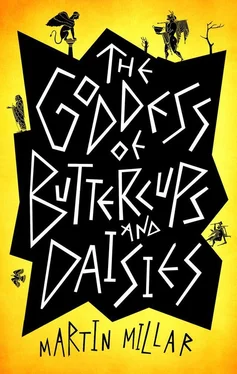Aristophanes noticed Luxos lying on the floor, his face still pale.
‘Thank you, Luxos.’
‘That was very stressful,’ mumbled Luxos.
‘The Athenian theatre is grateful for your efforts. The muses will reward you generously.’
Philippus, wearing the comic mask of the lead character, Trygaeus the farmer, had mounted the giant beetle. Lifted by the stage crane, he flew over the heads of the audience.
‘I’m off to heaven to visit the gods! I’ll find out why they’d abandoned us!’
On stage below, his daughter looked up in alarm.
‘My father’s gone mad!’
Trygaeus used his phallus as a rudder, steering the beetle from one side of the arena to the other. Below him, the audience howled with laughter.
‘Mad?’ he cried. ‘I’m the only sane person in Athens!’
It was rather beneath the dignity of a priestess to directly involve herself in bribery. Kleonike felt it was impious of Euphranor even to ask her. On the other hand, it did involve being paid a healthy commission. The upkeep of her temple required money, and that had been in short supply recently.
You could say that I was doing my religious duty, bringing in much-needed drachmas, thought Kleonike.
She intercepted Mnesarete on her way into the theatre. Mnesarete was a pretty young girl. Kleonike could see that she might well impress the judges if she walked onstage naked, as apparently she was intended to do.
‘Mnesarete. About your appearance at the end of the play.’
‘Yes?’
Kleonike produced a bag of silver coins, and showed her one of them, a bright, new tetradrachm.
‘What if a sudden unfortunate headache made you unable to appear?’
Mnesarete looked at the gleaming coin, and then at the bag.
‘Now you mention it,’ she said. ‘I am feeling rather unwell.’
She held out her hand. Kleonike gave her the bag of coins.
‘I should probably go home and rest,’ said Mnesarete.
Trygaeus flew to heaven and dismounted from the beetle. In heaven — which was of course the same wooden stage he’d taken off from a few minutes before — he was surprised to find there was no one there. All the gods and goddesses seemed to have departed. Only Hermes remained.
The actor playing Hermes, in a mask less comic and more dignified than those worn by the other performers, looked imperiously down at Trygaeus as he approached. Meanwhile the chorus moved smoothly into position, ready to assist in the conversation.
‘You shameless villain!’ cried Hermes. ‘How dare you invade heaven on a giant dung beetle.’
‘I’m not a villain! I’m Trygaeus of Athmonon in Athens, an honest farmer. I’ve brought you a present!’
Trygaeus pulled some meat from his bag and offered it to Hermes, who wolfed it down rather quickly. His hostility towards his visitor visibly lessened.
‘I’m here to talk to Zeus,’ said the farmer. ‘Is he around?’
‘Is he around? You’ve come looking for Zeus? Ha! You’ve wasted your time. The gods all packed up and left.’
‘Why?’
‘Because they’re sick of you,’ replied Hermes, imperiously. ‘Sick of you Athenians, and Spartans, and all the other Greeks fighting all the time. They moved out, and they left War behind to do whatever he wants with you.
‘And can you blame them?’ he continued, declaiming loudly as he turned to face the audience. ‘Every time they gave your cities an opportunity for peace, you rejected it. If the Spartans got an advantage in battle, they’d clamour for the war to continue so they could make the Athenians pay. If the Athenians got an advantage, they did exactly the same thing. Both cities could have ended the war any time in the past decade but you were all too stubborn.’
The audience were responding well. Laughter rolled around the amphitheatre and for the first time a festive atmosphere could be felt in the warmth of the late afternoon.
Not everyone in the audience was happy. General Lamachus, seated with other notable citizens, was scowling silently. In the less prestigious seats, Hyperbolus and Euphranor were looking annoyed.
‘I don’t like the way the audience is lapping this up,’ said the weapon-maker.
‘Don’t worry,’ growled Hyperbolus. ‘There are still some surprises to come.’
On the low wooden stage, Trygaeus was still engaged in conversation with the god Hermes.
‘Surely the Goddess of Peace hasn’t completely abandoned us?’
‘Peace?’ said Hermes. ‘War took her and threw her in a cave. You’ll never see her again.’
The chorus sighed, lamenting for Greece, and singing of her continuing misfortune. Watching from the wings, Aristophanes allowed himself a tiny ray of optimism. They’d had a rocky start, but the play was now going well.
‘Wait till the audience sees our giant statue,’ whispered Hermogenes. ‘It’s going to be great.’
The rescue of the Goddess of Peace, in the form of their new statue, had gone brilliantly in rehearsal. The statue was so splendid, so noble, so colourful, so fitting for the Goddess of Peace in every way, that the sight of it being brought up from the underground cavern couldn’t fail to impress the audience. It would rise through the trapdoor as a magnificent symbol of the possibility of ending the war and restoring Athens to its former state of peace and prosperity.
At the centre of the stage Trygaeus was going about the business of rescuing Peace. He’d gathered together the men of the chorus, now representing the honest farmers and artisans of Athens. A rope had been lowered into the trapdoor.
‘Citizens of Greece, if we’re going to rescue Peace we need everyone to pull together — stop laughing at the back — get these weapon-makers and politicians out the way, we only need farmers and honest citizens here. Everyone ready? Pull!’
There was great straining and effort as they attempted to rescue Peace. The trapdoor opened slowly. The audience held their breath.
‘Here she comes!’ cried Trygaeus. ‘We’ve rescued the great Goddess of Peace!’
Peace emerged. Unfortunately, it was not the magnificent new statue as paid for by Aristophanes. It was instead the tiny, ragged doll they’d been using in rehearsal. It rose on the end of the rope, a pathetic sight, and one quite baffling for the audience. Trygaeus, caught unawares, looked at it, completely nonplussed. The chorus shifted uncomfortably, not knowing what had gone wrong.
In the stalls, Hyperbolus and Euphranor roared with laughter and took the opportunity to start booing again, their catcalls being taken up by their allies in the audience.
‘Booooo! Booooo!’
‘We hate your pathetic statue!’
‘Aristophanes is making fools of us.’
In the wings, Aristophanes and Hermogenes were open-mouthed with horror.
‘Hyperbolus and his cronies have switched our statues!’
‘It’s a disaster,’ wailed Aristophanes.
Trygaeus was an experienced actor, and used to things going wrong. Even so, this was a severe blow and one that was difficult to cope with. He did his best.
‘Eh… you see, fellow Greeks, by our combined efforts we have rescued the great Goddess of Peace — or rather this small but nonetheless impressive representation of her — but the eh… important point is, we all worked together and —’
The audience were not so easily pacified.
‘Booooo! It’s the worst prop ever! They’re too cheap to spend any money! Booooo!’
Aristophanes sprinted down the stairs to the room beneath the trapdoor. He cursed his naivety in not posting a guard there, but really, the Dionysia was meant to be a sacred occasion. He hadn’t been expecting his enemies to stoop so low as to interfere with his props.
Читать дальше












